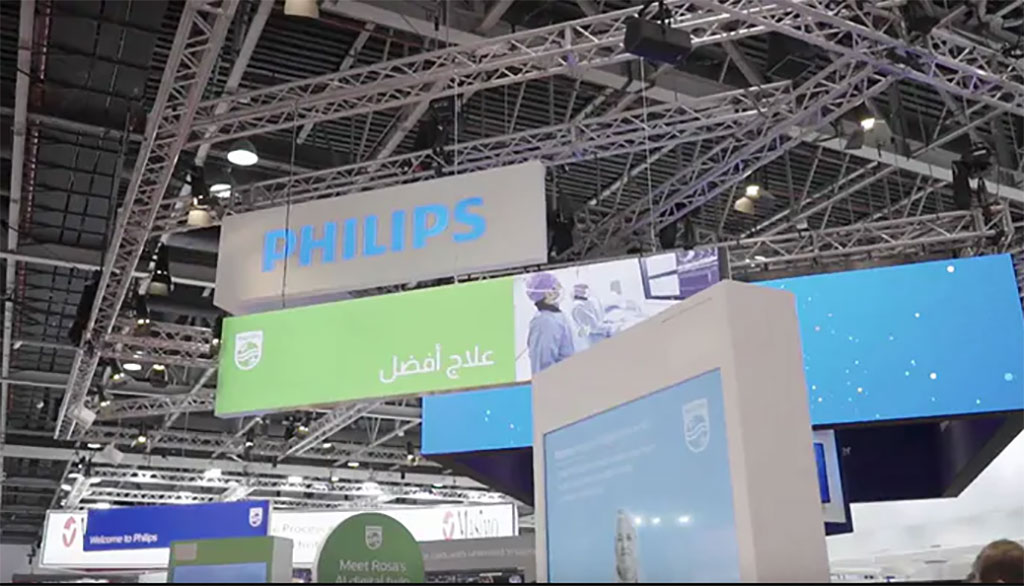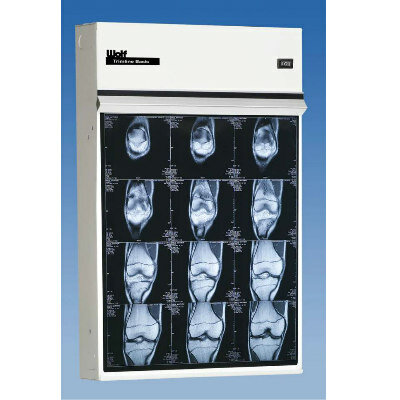Philips Introduces Future of Healthcare at Arab Health 2021
|
By HospiMedica International staff writers Posted on 21 Jun 2021 |

Illustration
Philips Healthcare (Amsterdam, Noord-Holland) demonstrated at this year’s Arab Health how the company’s break-through AI-enabled and connected solutions in the areas of oncology, radiology, telehealth, healthcare informatics, sleep & respiratory care, and acute care patient management, are transforming the future of healthcare.
Philips demonstrated how its Hospital to Home Enterprise Telehealth Programs can help organizations meet the goals of the quadruple aim. The Philips eICU program is a transformational critical care tele-ICU program that combines A/V technology, predictive analytics, data visualization and advanced reporting capabilities, delivered by Philips experts with more than 15 years of proven success. Philips eICU is a scalable, centralized solution that extends critical care resources to the bedside via technology, independent of the health facility’s location. This centralized (hub and spoke) model puts an intensivist-led team in a central monitoring facility where they can be responsible for 50–500 remote ICU beds. It is not a replacement for the bedside team, but rather a support system to continuously advance the established plan of care.
Philips highlighted its Lumify integrated tele-ultrasound powered by Reacts collaborative platform, a cutting-edge, hand-held system that turns any compatible smart device into an integrated tele-ultrasound machine. Philips also highlighted its ultimate ultrasound solution for pediatric assessment that is customized to provide quick, confident imaging, using advanced technology for a non-ionizing, gentler modality tailored to the specific needs of children.
It also demonstrated how the Philips Digital Pathology scanner and imaging-informatics solutions for pathology laboratories enable remote reviewing of pathological cases to prevent delay in critical patient diagnosis and care, particularly during COVID-19. In the area of Radiology Informatics, Philips showcased its scalable, modular architecture that integrates with existing systems to deliver data and tools across the enterprise - from radiology data reporting to enterprise-wide ingestion and archiving, to full patient and clinical data management.
Among Philips’ Radiology solutions highlighted at Arab Health 2021 were the Ingenia Ambition 1.5T MRI system, Incisive CT system, Vereos, the world’s first and only fully digital, clinically proven, PET/CT solution, and the DigitalDiagnost C90 premium DR room that is designed to meet the diagnostic imaging needs of the most demanding institutions. Philips also demonstrated IntelliSpace Portal, its advanced visualization and analysis software solution designed to support diagnostic process, follow-up and communication across clinical domains and modalities, through a connected and secure workflow. The solution is a multi-modality and multi-vendor comprehensive suite of advanced visualization solutions for Radiology. It can scale to fit large scale enterprises, helping to maximize resources by leveraging analytical tools.
Related Links:
Philips Healthcare
Philips demonstrated how its Hospital to Home Enterprise Telehealth Programs can help organizations meet the goals of the quadruple aim. The Philips eICU program is a transformational critical care tele-ICU program that combines A/V technology, predictive analytics, data visualization and advanced reporting capabilities, delivered by Philips experts with more than 15 years of proven success. Philips eICU is a scalable, centralized solution that extends critical care resources to the bedside via technology, independent of the health facility’s location. This centralized (hub and spoke) model puts an intensivist-led team in a central monitoring facility where they can be responsible for 50–500 remote ICU beds. It is not a replacement for the bedside team, but rather a support system to continuously advance the established plan of care.
Philips highlighted its Lumify integrated tele-ultrasound powered by Reacts collaborative platform, a cutting-edge, hand-held system that turns any compatible smart device into an integrated tele-ultrasound machine. Philips also highlighted its ultimate ultrasound solution for pediatric assessment that is customized to provide quick, confident imaging, using advanced technology for a non-ionizing, gentler modality tailored to the specific needs of children.
It also demonstrated how the Philips Digital Pathology scanner and imaging-informatics solutions for pathology laboratories enable remote reviewing of pathological cases to prevent delay in critical patient diagnosis and care, particularly during COVID-19. In the area of Radiology Informatics, Philips showcased its scalable, modular architecture that integrates with existing systems to deliver data and tools across the enterprise - from radiology data reporting to enterprise-wide ingestion and archiving, to full patient and clinical data management.
Among Philips’ Radiology solutions highlighted at Arab Health 2021 were the Ingenia Ambition 1.5T MRI system, Incisive CT system, Vereos, the world’s first and only fully digital, clinically proven, PET/CT solution, and the DigitalDiagnost C90 premium DR room that is designed to meet the diagnostic imaging needs of the most demanding institutions. Philips also demonstrated IntelliSpace Portal, its advanced visualization and analysis software solution designed to support diagnostic process, follow-up and communication across clinical domains and modalities, through a connected and secure workflow. The solution is a multi-modality and multi-vendor comprehensive suite of advanced visualization solutions for Radiology. It can scale to fit large scale enterprises, helping to maximize resources by leveraging analytical tools.
Related Links:
Philips Healthcare
Latest Arab Health 2021 News
- Konica Minolta Presents Comprehensive Portfolio of Diagnostic Imaging Solutions at Arab Health 2021
- Barco Demonstrates Next-Generation Surgical and Diagnostic Solutions at Arab Health 2021
- Neusoft Showcases NeuAngio 30F High Speed Floor-Mounted DSA System at Arab Health
- Elekta Showcases Innovative Interventional Radiotherapy Solutions at Arab Health 2021
- Karl Storz Highlights Breakthrough Imaging Technology IMAGE1 S Rubina for Endosurgical Procedures
- Siemens Presents Breakthrough Innovations in Imaging and Therapy at Arab Health 2021
- GE Healthcare Showcases Intelligently Efficient Offerings at Arab Health 2021
- Dräger Exhibits State-of-the-Art Ventilation Technology at Arab Health 2021
- Carestream Introduces Glass-Free Lux 35 Detector at Arab Health 2021
- Arab Health 2021 Showcases Latest Healthcare Technologies and Innovations in Post-Pandemic Edition
Channels
Artificial Intelligence
view channel
AI-Powered Algorithm to Revolutionize Detection of Atrial Fibrillation
Atrial fibrillation (AFib), a condition characterized by an irregular and often rapid heart rate, is linked to increased risks of stroke and heart failure. This is because the irregular heartbeat in AFib... Read more
AI Diagnostic Tool Accurately Detects Valvular Disorders Often Missed by Doctors
Doctors generally use stethoscopes to listen for the characteristic lub-dub sounds made by heart valves opening and closing. They also listen for less prominent sounds that indicate problems with these valves.... Read moreCritical Care
view channel
Powerful AI Risk Assessment Tool Predicts Outcomes in Heart Failure Patients
Heart failure is a serious condition where the heart cannot pump sufficient blood to meet the body's needs, leading to symptoms like fatigue, weakness, and swelling in the legs and feet, and it can ultimately... Read more
Peptide-Based Hydrogels Repair Damaged Organs and Tissues On-The-Spot
Scientists have ingeniously combined biomedical expertise with nature-inspired engineering to develop a jelly-like material that holds significant promise for immediate repairs to a wide variety of damaged... Read more
One-Hour Endoscopic Procedure Could Eliminate Need for Insulin for Type 2 Diabetes
Over 37 million Americans are diagnosed with diabetes, and more than 90% of these cases are Type 2 diabetes. This form of diabetes is most commonly seen in individuals over 45, though an increasing number... Read moreSurgical Techniques
view channel
Miniaturized Implantable Multi-Sensors Device to Monitor Vessels Health
Researchers have embarked on a project to develop a multi-sensing device that can be implanted into blood vessels like peripheral veins or arteries to monitor a range of bodily parameters and overall health status.... Read more
Tiny Robots Made Out Of Carbon Could Conduct Colonoscopy, Pelvic Exam or Blood Test
Researchers at the University of Alberta (Edmonton, AB, Canada) are developing cutting-edge robots so tiny that they are invisible to the naked eye but are capable of traveling through the human body to... Read more
Miniaturized Ultrasonic Scalpel Enables Faster and Safer Robotic-Assisted Surgery
Robot-assisted surgery (RAS) has gained significant popularity in recent years and is now extensively used across various surgical fields such as urology, gynecology, and cardiology. These surgeries, performed... Read morePatient Care
view channelFirst-Of-Its-Kind Portable Germicidal Light Technology Disinfects High-Touch Clinical Surfaces in Seconds
Reducing healthcare-acquired infections (HAIs) remains a pressing issue within global healthcare systems. In the United States alone, 1.7 million patients contract HAIs annually, leading to approximately... Read more
Surgical Capacity Optimization Solution Helps Hospitals Boost OR Utilization
An innovative solution has the capability to transform surgical capacity utilization by targeting the root cause of surgical block time inefficiencies. Fujitsu Limited’s (Tokyo, Japan) Surgical Capacity... Read more
Game-Changing Innovation in Surgical Instrument Sterilization Significantly Improves OR Throughput
A groundbreaking innovation enables hospitals to significantly improve instrument processing time and throughput in operating rooms (ORs) and sterile processing departments. Turbett Surgical, Inc.... Read moreHealth IT
view channel
Machine Learning Model Improves Mortality Risk Prediction for Cardiac Surgery Patients
Machine learning algorithms have been deployed to create predictive models in various medical fields, with some demonstrating improved outcomes compared to their standard-of-care counterparts.... Read more
Strategic Collaboration to Develop and Integrate Generative AI into Healthcare
Top industry experts have underscored the immediate requirement for healthcare systems and hospitals to respond to severe cost and margin pressures. Close to half of U.S. hospitals ended 2022 in the red... Read more
AI-Enabled Operating Rooms Solution Helps Hospitals Maximize Utilization and Unlock Capacity
For healthcare organizations, optimizing operating room (OR) utilization during prime time hours is a complex challenge. Surgeons and clinics face difficulties in finding available slots for booking cases,... Read more
AI Predicts Pancreatic Cancer Three Years before Diagnosis from Patients’ Medical Records
Screening for common cancers like breast, cervix, and prostate cancer relies on relatively simple and highly effective techniques, such as mammograms, Pap smears, and blood tests. These methods have revolutionized... Read morePoint of Care
view channel
Critical Bleeding Management System to Help Hospitals Further Standardize Viscoelastic Testing
Surgical procedures are often accompanied by significant blood loss and the subsequent high likelihood of the need for allogeneic blood transfusions. These transfusions, while critical, are linked to various... Read more
Point of Care HIV Test Enables Early Infection Diagnosis for Infants
Early diagnosis and initiation of treatment are crucial for the survival of infants infected with HIV (human immunodeficiency virus). Without treatment, approximately 50% of infants who acquire HIV during... Read more
Whole Blood Rapid Test Aids Assessment of Concussion at Patient's Bedside
In the United States annually, approximately five million individuals seek emergency department care for traumatic brain injuries (TBIs), yet over half of those suspecting a concussion may never get it checked.... Read more
New Generation Glucose Hospital Meter System Ensures Accurate, Interference-Free and Safe Use
A new generation glucose hospital meter system now comes with several features that make hospital glucose testing easier and more secure while continuing to offer accuracy, freedom from interference, and... Read moreBusiness
view channel
Johnson & Johnson Acquires Cardiovascular Medical Device Company Shockwave Medical
Johnson & Johnson (New Brunswick, N.J., USA) and Shockwave Medical (Santa Clara, CA, USA) have entered into a definitive agreement under which Johnson & Johnson will acquire all of Shockwave’s... Read more















